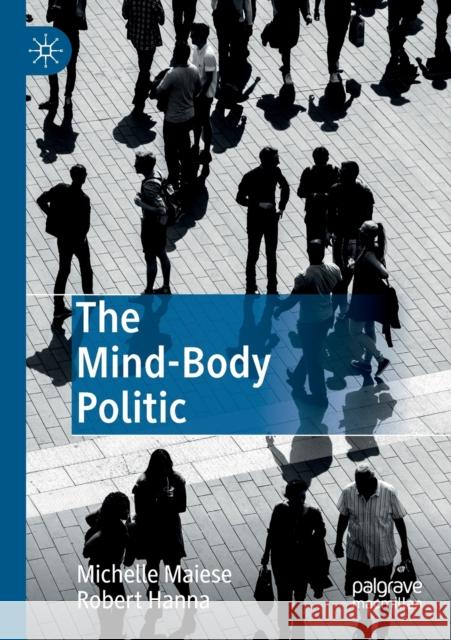The Mind-Body Politic » książka



The Mind-Body Politic
ISBN-13: 9783030195489 / Angielski / Miękka / 2020 / 320 str.
The Mind-Body Politic
ISBN-13: 9783030195489 / Angielski / Miękka / 2020 / 320 str.
(netto: 345,02 VAT: 5%)
Najniższa cena z 30 dni: 346,96
ok. 16-18 dni roboczych.
Darmowa dostawa!
"The book is not only an exposition of political discourse but concurrently an analysis of form, a rich and ambitious undertaking." (Isobel Armstrong, Modern Philology, Vol. 117 (1), May, 2019)
1. Chapter 1. Introduction: Political Philosophy of Mind
1.1. The Philosophy of Mind
1.2. Emancipatory Political Theory
2. Chapter 2. Three Theses Unpacked: Mind-Shaping, Collective Sociopathy, and Collective Wisdom
2.1. The Mind-Shaping Thesis
2.1.1. Its Meaning
2.1.2. Enactivism, Affective Framing, and Habits
2.1.3. Affordances and Enculturated Expectations
2.1.4. Its Truth
2.2. The Collective Wisdom Thesis
2.2.1. Its Meaning
2.2.2. Its Truth
2.3. The Collective Sociopathy Thesis2.3.1. Its Meaning
2.3.2. Its Truth
2.4. Mind-Shaping Inside Sociodynamic Systems
3. Chapter 3. What is a Destructive, Deforming Institution?
3.1. True Needs, False Needs, False Freedom of Choice, and Collective Sociopathy
3.2. Eight Criteria, How To Make Them Vivid, and How To Explain Them
3.2.1. Commodification
3.2.2. Mechanization
3.2.3. Coercion
3.2.4. Divided Mind3.2.5. Reversal of Affect
3.2.6. Loss of Autonomy
3.2.7. Incentivization of Desires
3.2.8. False Consciousness***
3.3. How To Prove These Claims
4. Chapter 4. Case-Study I: Higher Education in Neoliberal Nation-States
4.1. Higher Education as The Higher Commodification
4.1.1. “Mind Invasion” and Collective Sociopathy
4.1.2. Neoliberal U
4.1.3. The Affective Pull of Neoliberal Ideology
4.2. Neoliberal U and the Eight Criteria of Collective Sociopathy
4.2.1. Commodification
4.2.2. Mechanization
4.2.3. Coercion
4.2.4. Divided Mind
4.2.5. Reversal of Affect
4.2.6. Loss of Autonomy4.2.7. Incentivization of Desires
4.2.8. False Consciousness
***
4.3. Shared Expectations in Online Education
5. Chapter 5. Case-Study II: Mental Health Treatment in Neoliberal Nation-States
5.1. Dr Bigbrother: The Medical Model and Neoliberalism
5.2. Doing It By the DSM: Mental Healthcare and the Eight Criteria of Collective Sociopathy
5.2.1. The Commodification of Mental “Health” and “Normalcy”
5.2.2. Mechanization5.2.3. Coercion: “Governmentality” in the Realm of Mental Health
5.2.3a. Excursus: The Rhetoric of “Responsibilization,” “Resilience,” and “Recovery”
5.2.3b. Excursus Continued: The Resilient Student
5.2.4. Divided Mind
5.2.5. Reversal of Affect: Alienation
5.2.6. Loss of Autonomy
5.2.7. Incentivization of Desires
5.2.8. False Consciousness
***
6. Chapter 6. What is a Constructive, Enabling Institution?
6.1. Negating and Reformulating the Eight Criteria
6.1.1. Anti-Commodifying or Self-Realizing
6.1.2. Anti-Mechanistic or Organicist6.1.3. Anti-Coercive or Dignitarian
6.1.4. and 6.1.5. Anti-Mind-Dividing or Integrative, and Anti-Affect-Reversing or Authenticating
6.1.6. Anti-Autonomy-Damaging or Autonomy-Promoting6.1.7. Anti-Desire-Incentivizing or True-Desire-Promoting
6.1.8. Anti-False-Consciousness-Producing or Critical-Consciousness-Priming
6.2. Affording Flexible Habits of Mind
6.3 How to Expunge Our Inner Hobbes
6.4. Real-World Examples of Collectively Wise Institutions
6.4.1. Disaster Communities
6.4.2. Various Phases in the History of the American Left
7. Chapter 7. How To Design a Constructive, Enabling Institution
7.1. Affective Framing Patterns Redux7.2. The Cognitivist Approach to Transformative Learning
7.3. Enactivism, Essential Embodiment, and Affective Framing
7.4. The Neurobiological Dynamics of Affective Reframing
7.5. Tapping Into the Affective Dimension of Transformative Learning***
8. Chapter 8. Conclusion: Cognitive Walls, Cognitive-Affective Revolution, and Real-World Utopias
Michelle Maiese is Professor of Philosophy at Emmanuel College in Boston, Massachusetts, USA. She is the author of Embodiment, Emotion, and Cognition (2011), Embodied Selves and Embodied Minds (2015), and many articles on topics in philosophy of mind and psychiatry.
1997-2026 DolnySlask.com Agencja Internetowa
KrainaKsiazek.PL - Księgarnia Internetowa









